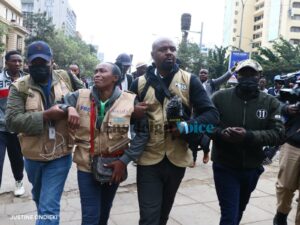
Growing up, my late father ruled our household with a terrifying blend of cruelty and affection. In his eyes, disobedience was an unforgivable sin, and he dealt with it swiftly and brutally. I remember the beatings—the sharp sting of his leather belt on our backs and the harsh, scolding words that echoed through the house.
Mum, on the other hand, was easygoing. She allowed us to bend the rules sometimes- like staying up late to get lost in the Forrester family’s glamorous drama in The Bold and the Beautiful or enjoy Wrestling or watch Vioja Mahakamani with excitement on dad’s forbidden black-and-white, battery-powered, red Great-wall TV.
But when Dad’s voice roared from the gate, we’d scatter in one instant, suddenly busy with nothing. My siblings and I would tremble like leaves in the wind, our hearts pounding heavily as we struggled to understand why the man meant to protect and lavish us with love was also our greatest source of fear and pain.
Yet, as his wrath subsided, something unexpected happened. Dad would transform, his harsh demeanor softening. His voice would lose its sharp edge, and the man who had just terrified us would now turn into a figure of affection.
He would spoil us with gifts, like buying us new Christmas clothes, even when it was still half a year away, take us on village market outings, and in the evening he would seat eight of us together and sing nostalgic zilizo pendwa (Rhumba) tunes, accompanied by his quirky dance moves. These moments would brighten our days like rays of sunshine piercing through dark clouds, bringing warmth and smiles to our tear-streaked faces.
In those fleeting moments of joy, we’d forget the terror and agony he had inflicted just days before. This cycle of fear and affection was his way of maintaining authority—ensuring that we revered, feared, and never dared to question or second-guess his headship in the home.

Watching the current political events in Kenya, I see a striking parallel to my father’s authoritarian style in President William Ruto’s governance. The country has become a stage for a grim performance, where the state seems to dance between brutal force and calculated benevolence to maintain control over its citizens.
Under Ruto’s administration, terror is becoming a common tool of governance. Chilling sights and accounts of abductions in broad daylight—where individuals are forcibly shoved into unmarked vehicles and driven away, only to reappear days or weeks later, broken or dead—are too many to ignore.
The brutal tactics used by security officers—including indiscriminate use of teargas and water cannon fire, along with rubber and live bullets aimed at unarmed protesters and those with recording devices including journalists—are all designed to intimidate, instill maximum fear, and deter any questioning of Ruto’s administration going forward.
Arbitrary arrests have become routine, with citizens detained without cause, held incommunicado, and families left in the dark about their fate. Kenya National Commission on Human Rights (KNCHR) reports at least 60 deaths from bullet wounds, over 400 hospitalizations from gunshots and beatings, more than 60 missing or abducted, and at least 860 arrests nationwide, with most occurring in Nairobi..
These actions are not just violations of basic human rights; they are deliberate attempts to instill fear and remind the populace that the state’s power remains absolute, even under the progressive 2010 constitution.
One of the most chilling examples of state-sponsored terror occurred just two days ago on August 8, when businessman Jimi Wanjigi’s Muthaiga residence was raided. The commando-style operation, executed with military precision as if targeting a high-profile fugitive like the U.S. Navy SEAL team’s raid on Al-Qaeda’s Osama Bin Laden in May 2011, felt more like an action movie scene than a real-life event in Kenya.
The sight of heavily armed officers storming a private residence, battering down doors, and the fear gripping Wanjigi’s family and neighbors was meant to sent a strong and stark message that no one is beyond the state’s power, and that dissent and defiance to President Ruto’s administration will be met with might force. Wanjigi, a fierce critic of Ruto’s government, has strongly opposed to the government’s appetite for national borrowing, arguing it’s not in Kenyans’ best interest.
President Ruto’s security forces, emboldened by his own unapologetic stance, have been acting with chilling impunity. They operate with the confidence that their actions are sanctioned by the highest authority, in the land. And so, the cycle of fear continues, with the Kenyan people living under the constant threat of state violence.

Yet, like my father, Ruto is quick to follow his terror with calculated benevolence. After each wave of state-sponsored violence, he embarks on a meet-the-people campaign to soften his image, reassure the public that he is not a tyrant but a leader who cares deeply about their well-being.
Since the protests began in June, Ruto has crisscrossed several counties, holding rallies where he speaks of peace, unity, and a brighter future. He portrays himself as a leader in touch with the people, alive to their challenges and demands of Kenyans, especially the Gen Z protesters who have been on the streets since June 18 demanding better governance and accountable leadership.
Speaking from the tops of vehicles surrounded by cheering crowds, he makes lofty and endless promises of economic transformation, job creation, and inclusivity. These assurances are crafted to rebuild trust, and to present him as a compassionate and visionary leader despite the ongoing climate of fear and simmering resentment.
For instance, during his recent visits to coastal and Mt Kenya regions – Mombasa, Kwale, and Taita Taveta, Kiharu, Meru, Kirinyaga among others, President Ruto promised new ports, infrastructure, and agricultural revitalization to boost local economies.
He’s everywhere, commissioning, launching, and even re-launching old projects. These projects, the ports, the jobs—these are the “goodies” he dangles before the people, hoping to pacify and distract them from the fear he has instilled through beatings of peaceful protesters he calls as “anarchists” on the streets. These acts of benevolence are clearly timed to follow the state’s repressive actions, as if to proclaim, “Yes, we are powerful and tough on you, but we are also kind and caring.”
President Ruto’s rhetoric and display are not without his lavish gestures of generosity, paired with a show of false humility. He is seen mingling freely with impoverished women in their grass-thatched homes, connecting electricity while exchanging pleasantries over a cup of tea.
Other times he is seen clutching children to his chest atop his armored presidential Cadillacs, or making donations in mega churches, all while ensuring these moments are captured and broadcasted nationwide. These actions again are aimed to present him as a powerful yet compassionate leader—tough on crime but tender with his people
But just as my father’s gifts were a means to an end, so too are Ruto’s acts of kindness. Many Kenyans including his own praise and worship minions believe these gestures are not driven by genuine concern but are tools to restore his image and maintain unchallenged authority. The fear instilled by his security forces is meant to suppress dissent, while his benevolence is designed to win back those who might resist.
The result is a population trapped in a cycle of fear and dependence. Just as my siblings and I learned to both respect and fear my father, Ferdinand Simiyu Kituyi, Kenyans, especially the youth, are being conditioned to view President Ruto as the ultimate authority—someone to be obeyed, respected, and feared. However, this strategy isn’t new; tyrants and despots have used it throughout history to maintain control through fear, enforced compliance, and to keep their power unchallenged and regimes unshaken.
Just as my father’s cycle of terror and affection in our village of Nabikoto, Naitiri township in Bungoma County, kept us in line, Ruto’s approach is to keep the Kenyan people compliant—too fearful to resist and too dependent to rebel.
It is actually a nice and helpful piece of info. I?¦m happy that you just shared this helpful information with us. Please stay us up to date like this. Thank you for sharing.